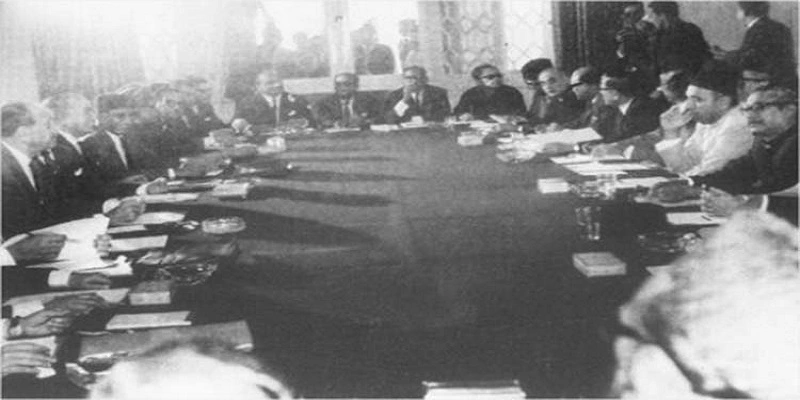Decoding the Complex Dynamics of Pakistan-USSR Relations in the Cold War Era
Relationships with U.S.S.R. and Pakistan have witnessed a variety of downs and ups during the initial decade following the Pakistani independence. This period is significant in that the world was divided into two parts which were communist, led by the soviet union and capitalist, led by the United States of America. The war between the U.S.A. and U.S.S.R. created a dilemma for the newly independent states to decide who would be the most suitable to establish a friendship with. Apart from the animosity between these two superpowers Pakistan as well as India's rivalry has greatly influence their foreign policy of both as well as the Cold War rivals toward the two countries as well. Thus, Pakistan policies and nuances are better understood from this perspective. It's not just that, Indian foreign policymakers were also not able to ignore Pakistani decisions. It is important to note that Pakistan eventually made the choice to join the western bloc. In the process, resulted in hostility toward Pakistan in Moscow since she was not keen for south Asian nations to get involved in the battle between the superpowers. After experiencing a series of turbulences, Islamabad and the Kremlin leaders realized they would not be able to remain in the same place for long. They had to strengthen ties to enhance the region, and also to secure their mutual interests.
When Khrushchev was appointed head as the head of government displayed his feelings towards Pakistan and wished to establish a good relationship with Pakistan. The Soviet ambassadors in Islamabad sent the invitation to Khrushchev to President Ayub, which president Ayub immediately received. The visit of Ayub to Moscow was scheduled for April 1965. One thing worth noting in this regard is that both countries believed that the main reason for their chilly relationship was the absence of any visits of their leaders to one their respective countries.
First, it is essential to discuss in a superficial manner the motives of the different policy of foreign affairs of both countries. In the case of Pakistan tensions with India is a significant factor that entices Pakistani decision makers to make their own new policies. Furthermore the Ayub the era Pakistan had adopted a policy of bilateralism that was primarily based on relations with the U.S.A., U.S.S.R. and chChinaimultaneously. However, the shift in Soviet policy was primarily concerned with Pakistan's expanding relations with the People's Republic of China, another important player in the region. Other important issues had to be discussed at the highest level in order to safeguard both countries' interests. Pakistan was worried about the position of the Soviet Union in the matter of Kashmir and the pashtoonistan issue and the growing military assistance provided by the Soviets to India. Soviets were eager to discuss the usage of Pakistan facilities by America and Pakistan's participation in the western military accords.
Ayub attempted to justify his participation in the western parts and stated that the most pressing problem for Pakistan was security. To achieve this, Pakistan was required to ensure that its security could be assured to a certain extent. He also assured the Soviet the leaders of his country that their territories would not be taken advantage of. Soviets, in order to ease the Pakistani concern about military aids provided to india they told Ayub that they provided India just a tiny amount of arms , which they did only were provided after their Chinese humiliating defeat of India. In addition, the soviets wanted to protect India from imperialism by western forces. Ayub Khan was able to eliminate the myth that Pakistan or Chinese relations do not rest on their shared animosity towards India rather than the Chinese positive intentions towards the region.
On the other hand, the Kremlin officials demanded that Pakistan ban the establishment of military bases by foreign forces within its territory, ban nuclear weapons from foreign countries within its borders and limit the scope of military collaboration with other military groups. After expressing their concerns and demands, nothing major emerged from this historic visit by Ayub however, it wasn't without concern for other powers. It was significant not because something positive came out of Pakistan but instead in the sense that the soviets' growing worry about Pakistan's complete backing of the U.S.A. decreased to a certain extent. At the least, Pakistan sent a message that she wasn't allied exclusively with the Western countries. However, she also wanted friendly relations with the Soviets too.
Another result of this trip was the threat from the People's Republic of China, which wanted to establish a positive relationship between China and Pakistan to free Pakistan from the perilous net of the Soviets. Incredibly, Washington wasn't too worried about this incident. She hoped to see a gap in the relationship between Islamabad and Peking, with which this trip could have created two. It also upset India because she didn't wish to see an alignment with a rival country like Pakistan having a relationship with communists. After all, it was revealed as a weak relationship, which made New Delhi so worried. The relationship also did nothing to be beneficial to Pakistan because the relationship would get worse in the coming years.
The dialogue on politics with other countries is considered beneficial for Pakistan. Pakistani foreign policymakers were severely criticized for having yet to take advantage of the opportunity to benefit from the opportunity Moscow offered Liaqat Ali Khan for talks to establish good relations. This time Pakistan tried to evaluate the Soviets, and came up with the results that showed that the soviets are not worthy of friendship with Pakistan. The failure of this trip was also due to the rigidity of Kremlin leaders and the distrust of Ayub's Soviet leaders.

